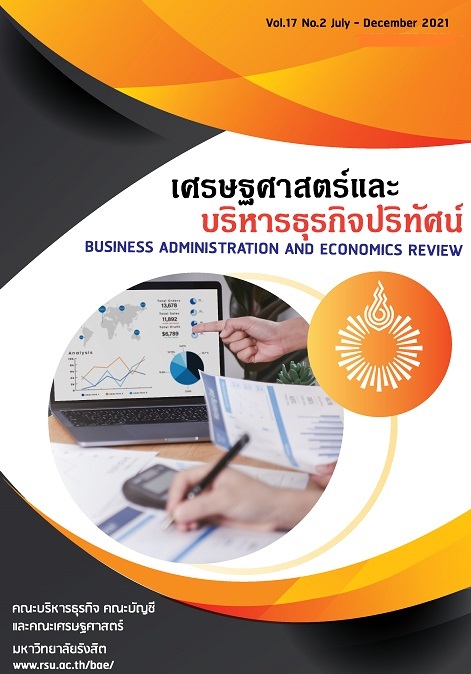COVID-19 and Economic Problems of the Urban Poor
Keywords:
Covid-19, Urban Poor, Bankok, Economic Impacts of Covid 19, slumsAbstract
This survey research explores effects of COVID 19 on the urban poor in Bangkok where is the most vulnerable area from the first country’s lockdown in 2020. Quesionares were used for purposive sampling and interview fragile households in low-income communities in 11 inner districts of Bangkok (for about 500 samples) and be analysed by qualitative and quantitative methods. Results indicate that economic variables such as the drop in income, the increase in poverty and debt were evident since the lockdown. Although adverse economic effects were the worst during the lockdown when poverty sharply increased, those negative effects remain high even after the lockdown period, Results also confirm that the poor – the lowest income group- has the highest ratios of expenditure to income and debt to income. Empirical results show that being unemplyed has the largest significant effect, among others such as the drop in income and expenditure, to the increased debt at 0.05 significant level. Results from this study lead to policy recommendations for short and long term.
References
Bangkok Metropolitan Administration (2018). Community Statistics in BMA (in Thai). Depatment of City Planning and Development, BMA.
Chantarat, Somaras, Atjana Lamsam, Narongrit Adultananusak, Lataporn Ratanavararak, Chonakarn Rittinon and Boonthida Sa-ngimnet (2020). “Thai Agricultural Households in COVID 19 Crisis” (in Thai), aBRIDGEd ISSUE 11, 15 May. www.pier.or.th/wp-content/uploads/2020/05/aBRIDGEd_2020_011.pdf
Fujita, Masahisa. (1989). Urban Economics Theory. Cambridge University Press.
Fujita, Masahisa. and J.F.Thisse (2001). Economics of Agglomeration: Cities, Industrial Location and Regional Growth. Cambridge University Press.
Hevia, Constantino and Andy Neumeyer (2020). A Conceptual Framework for Analyzing the Economic Impact of COVID-19 and its Policy Implications. UNDP LAC. March 20, 2020
International Labor Organization. (2020a.). COVID-19 and the world of work: Impact and policy responses, ILO, 18 March 2020
International Labor Organization. (2020b). Social Protection Outlook. ILO, May 2020.
Lekfuangfu, Warn N., Suphanit Piyapromdee, Ponpoje Porapakkarm, and Nada Wasi (2020). “On Covid-19: New Implications of Job Task Requirements and Spouse’s Occupational Sorting” PIER Discussion Paper No. 133.
Lertnitat, chakorn and Somchai Jitsuchon (2020). “The Fragility of Fragile group under COIVD-19” (in Thai), TDRI article, 2 June .TDRI. https://tdri.or.th/2020/06/impact-of-covid19-on-vulnerable groups/?fbclid=IwAR2unsWTtjnvQewGJss-MosMqQLoIYjaOCxXI6s6pYA9erUVp9RaUSLerN4
McCann, Philip. (2001). Urban and Regional Economics. Oxford University Press.
Otker-Robe, Inci and Anca Maria Podpiera (2014). “The Social Impact of Financial Crises Evidence from the Global Financial Crisis,” Policy Research Working Paper 6703. World Bank.
Downloads
Published
How to Cite
Issue
Section
License
Copyright (c) 2021 Business Administration and Economics Review

This work is licensed under a Creative Commons Attribution-NonCommercial-NoDerivatives 4.0 International License.
The contents in Business Administration and Economics Review can be used for publication. But do not modify, modify or use it for trade and profit.


